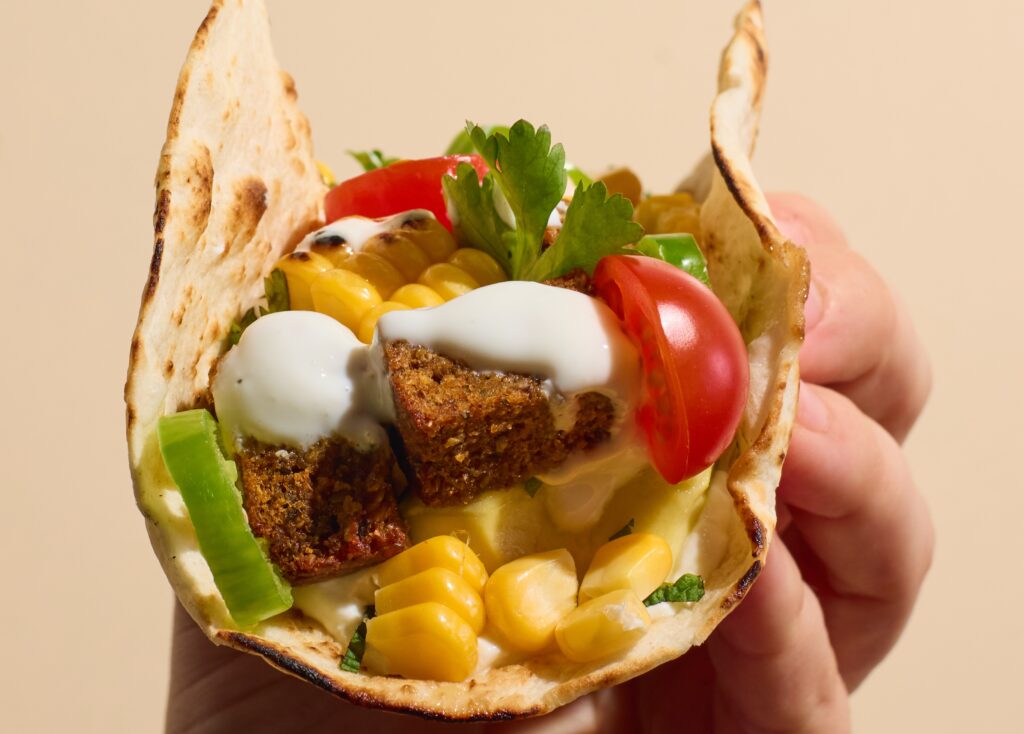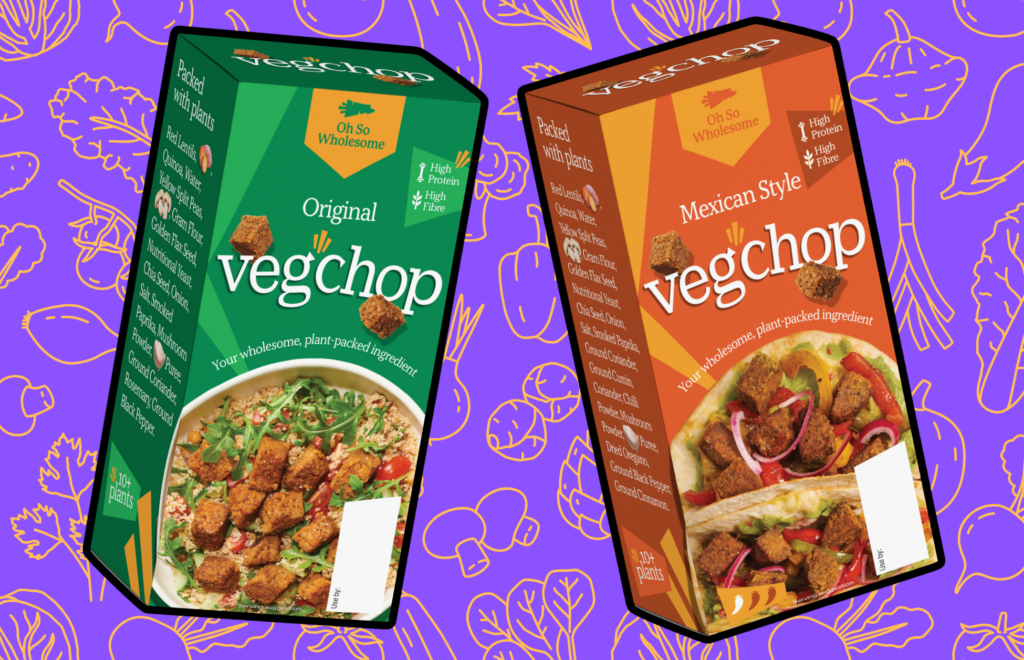The Plant-Based Reset: Can Whole-Food Proteins Like Veg’chop Win Over Consumers?
8 Mins Read
As sales of meat alternatives continue to slide, a new crop of whole-food plant protein formats is on the rise. Oh So Wholesome’s Veg’chop is among the products spearheading this shift.
This month, a shift seems to be occurring in Europe’s plant-based protein ecosystem. Austria’s Revo Foods, known for its vegan seafood, launched a Prime Cut product that isn’t intended to replicate meat, but instead offers consumers a “new class” of plant protein. And in the UK, the company behind THIS Isn’t Chicken has rolled out a Super Superfood that champions whole foods and is a self-proclaimed rival to tofu, rather than meat.
Next week, another whole-food plant-based protein format is launching at Tesco, the UK’s largest supermarket. Called Veg’chop, it has been years in the making.
Jason Gibb, founder of FMCG festival Bread & Jam, and Simon Day, who co-founded Squeaky Bean and The Cultured Collective, have been working on this new format for more than two years, one of the earliest innovators aiming to shake up the plant protein market.
Speaking to Green Queen in 2023, Day explained his vision for what was, at the time, dubbed Vegbloc. Packed with whole grains, vegetables, legumes and seeds, he described the idea as “a no-brainer”, made from ingredients and a process “based firmly in food heritage rather than novel science”.

Fast-forward to today, and boasting a few tweaks based on extensive customer testing and retailer feedback, Vegbloc has been rechristened Veg’chop, and will be sold under Day and co-founder Jason Gibb’s new brand, Oh So Wholesome.
“I wanted something that tasted like the plants it was made from and that I was happy to eat daily with my family,” says Gibb, who developed the product with Day after finding the current plant protein options on the market lacking.
Next week, their innovation will hit the shelves of 649 Tesco stores, positioned as an alternative to traditional vegan proteins like tofu and tempeh, as well as plant-based meat players like Beyond Meat.
Why Tesco bet big on plant-based whole foods
Veg’chop comes in a sausage-like chub shape, which can, as the name suggests, be chopped for use as a centrepiece in fajitas, curries, pasta dishes, salads and wraps, to name a few. It comes in two flavours (original and Mexican-style) and boasts 10g of protein, and 9-10g of fibre per serving.
The 250g pack, which retails for £3, features recognisable vegetable and grain ingredients like red lentils, quinoa, yellow split peas, mushrooms, gram flour, chia and flax seeds, onions and nutritional yeast (plus spices).
The product concept dovetails with key consumer trends in the UK. Gut health has been in sharp focus for the past few years, thanks to the popularity of apps like Zoe and the introduction of GLP-1 agonist drugs Wegovy and Mounjaro. A recent survey by Tesco showed that gut health is a top concern for 37% of Brits in 2025, which pushed the retailer to launch its own-label Gut Sense brand in January.
Meanwhile, 91% of Brits don’t eat enough fibre. Among children, only 4-14% consume the recommended amount. The Tesco poll showed that 70% of people are adding more fibre to their diet to maintain a healthy microbiome.

The push is being led by health experts like Tim Spector, who has popularised the 30-plants-a-week mantra. New food brands are jumping on the whole-plant bandwagon. Vegan CPG player Gosh! this month refreshed its packaging to introduce a ‘Plant Points’ system, highlighting how many plants each of its products contains. If you’re wondering, Veg’chop contains over 10 plants.
There was one more critical finding from Tesco’s research: 22% of Brits want to consume more plant-based foods. Last year, the retailer revealed that “veg-led meals” accounted for 40% of its plant-based sales, prompting it to go big on whole foods rather than meat alternatives in its vegan range for Christmas. Further, the retailer introduced a meat-free Root & Soul ready-meal line that put vegetables front and centre.
“Tesco specifically have often been at the forefront of plant-based category development in the UK and led with new ranges, and I see their backing of Veg’chop as another example of their strategic approach to the category,” Day tells Green Queen.
For Veg’chop, entering the CPG world makes perfect sense. Only a quarter of Brits say they choose a healthier food option when dining out, but this rises to two-thirds at supermarkets.
“Most retailers are looking for more plant-packed, healthy and minimally processed foods with clean ingredient lists across the store. In plant-based specifically, I think the whole market knows that some changes need to be made to excite shoppers and inspire home cooks,” says Day.
A new category, based on age-old plants

Explaining why Vegbloc became Veg’chop, he says: “People really valued the naturalness of our product and how wholesome the ingredient list was. Our original design didn’t reflect that, so we made a change to use a more natural colour palette.”
He adds: “The product name was changed from Vegbloc to Veg’chop to help people more quickly understand how to use the product. We also felt that Veg’chop had more appetite appeal than Vegbloc.” The overarching brand name, Oh So Wholesome, was added because there are other products in the pipeline “that will help people to eat more plants”.
The new format will be stocked alongside tofu, tempeh, falafels and meat alternatives – but will Brits take to it? Oh So Wholesome conducted consumer research to answer that very question, and found that there was widespread interest in ‘eating more veg’ and ‘natural products’.
“People really welcomed how conveniently Veg’chop could deliver this. They were often surprised by how much they liked the taste. There was also very high interest in Veg’chop (and appreciation of our ingredient list) from people concerned with ultra-processed foods [UPFs],” says Day.
In the UK, the main growth is coming from products that are versatile, healthy and perceived as natural, with clean ingredient lists – foods that you would be happy for your family to eat every day, as he explains.
“Veg’chop, tempeh and tofu epitomise this. The growth is largely from people who will continue to eat some meat and aren’t interested in products that seek to taste like meat,” he says, noting that rising interest in beans comes from the same place too.
“Along with other brands who sell these products and are doing a fantastic job, our work is to inspire people to cook with these whole-food products and arm them with recipes and high-quality products that ensure they love them when they eat them,” he adds.
“I’m also a believer that a long history in food is a good predictor of future longevity. Tofu and tempeh are obviously traditional products with a long history, and whilst our product is a new concept in a way, it is just made from plants that have a long history in cooking.”

UPF concerns have ‘forced hands’ of plant-based meat companies
The launch of products like Veg’chop, THIS’s Super Superfood, and Revo Foods’s Prime Cut comes after sales of meat alternatives fell by 7% in 2024, while tofu expanded its market share to reach 9% of households. One of the best-performing meat-free brands last year was Better Nature, whose sales grew by 476% (albeit from a small base) as the UK embraced their hero ingredient tempeh, a traditional Indonesian fermented soybean cake.
This comes on the back of rising concerns around UPFs, which make up 57% of the average Brit’s diet, and up to 80% when it comes to children or people with lower incomes. A December survey revealed that 90% of Brits agree that diet is an important factor in overall health, and among these consumers, 28% are likely to cut back on UPFs this year.
Meat alternatives have suffered as a result, with some deceptive media coverage amplifying the perception that all UPFs – including these ones – are bad for you, despite nutritionists saying otherwise.
Day believes some meat alternative makers have “had their hands forced”, and “probably wouldn’t have looked to whole foods/non-mimics if their mimic [product] sales were rocketing”. “I’m sure there are also some people who always wanted to do something in whole foods, but went where the growth was to start with,” he says.

As a food purchase driver, health isn’t going anywhere, and he expects that this will ensure the shift to whole-food plant-based continues. “Specific drivers like the need at a population level for us to eat more fibre (in the UK at least) and interest in the beneficial effects of eating a wide diversity of plants for the gut microbiome are also likely to support this direction,” he says.
“The backlash against UPF only seems to be gathering momentum and whilst there are nuances, I think products like ours will increasingly be looked for,” he adds. “In the future, food security and making these products from locally available plants could also be a factor. Meat mimics often rely on protein isolates that are not produced in sufficient quantity in many locations.”
This will make brand positioning essential, especially as Oh So Wholesome competes with established plant-based players like THIS, which raked in £22M in sales last year. “We welcome any plant-packed and nutritious launches in the category,” says Day.
“Plant-based needs to entice and inspire people who have been sceptical about the whole category – we want it to be a destination for people who want to eat more plants, and that will take more than one brand. I’m confident there is a role for a brand like us, which isn’t associated with what has come before, as well as for more established brands.”



